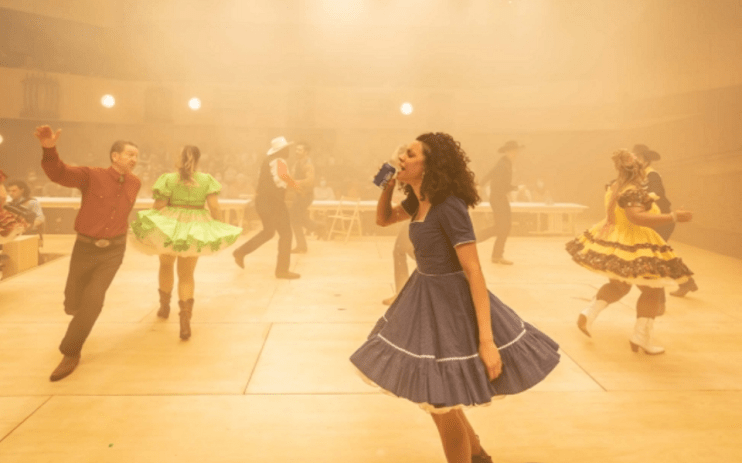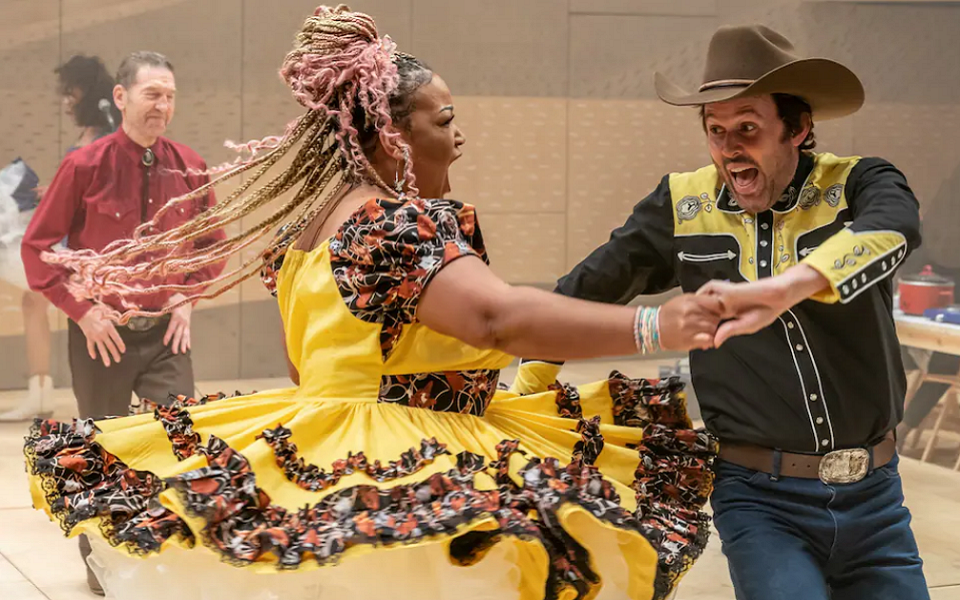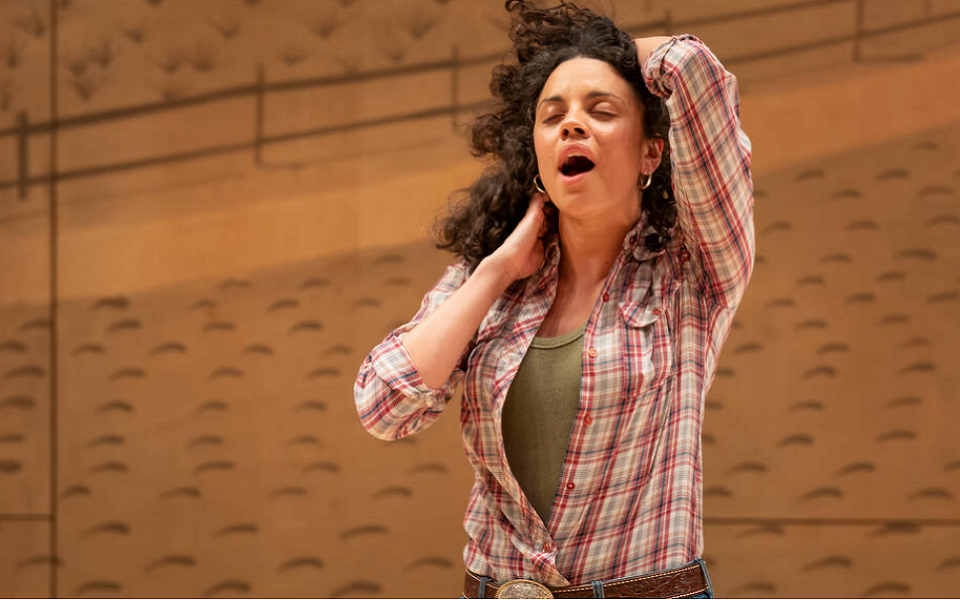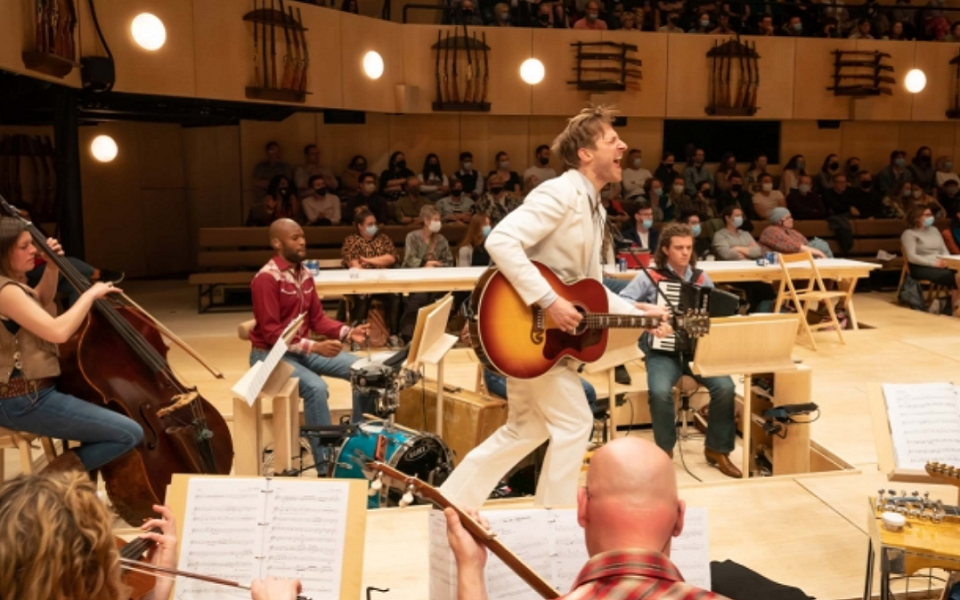Oklahoma review: Sexy, edgy production has highs and lows

It’s hardly the world’s best-kept secret that the musicals of Rodgers & Hammerstein, such as South Pacific and The Sound of Music, are crusty as hell. Written over 75 years ago, musical naysayers would call them sexist and perhaps even say their writing is banal – but many have retained a level of fame and respect for helping write the musical rulebook in the first place.
Oklahoma! certainly has. Sure, the script has been criticised as, by contemporary standards, a linear experience of thinly-sketched female characters swooning over men that aren’t sketched much more thickly. But everyone’s heard of Oklahoma!, which is partially what makes its 2022 return a big deal. (The last West End revival was in 1998 and starred a young breakthrough called Hugh Jackman in the title role as charismatic cowboy, Curly.)

Even more of a big deal is this boldly experimental production, which obeys none of the rules of a classic musical. Performed mostly with the lights on full bleed in the Young Vic’s main space, it feels more like watching a rehearsal than a polished finished product.
Staged in-the-round and set in rural Oklahoma in 1906, a series of cowboys and farm girls are lazing around discussing an upcoming dance social where it matters who you’re seen with. Curly is wooing local girl Laurey Williams, but he’s got competition from another farmhand, Jud Fry. Traditional versions of the musical springboard off this by producing a joyous show about a farming community and men and women courting. (To be fair though, when Oklahoma! Premiered in 1943, it was progressive for being one of the first musicals to use its numbers to move the story along.)
In Jordan Fein and Daniel Fish’s vastly updated show, Oklahoma! has attempted to do deep dives on modern touchpoint topics, such as toxic masculinity and feminism, through the lens of richer character studies, particularly of main men Curly McLain and Jud Fry, and young female lead Ado Annie.

There are moments which feel fragmented though, as the meandering backdrop of the rest of the story suffers from a lack of pace, dipping into segments which can’t offer the same energy or levels of freshness as the thumpingly bold moments. The first 20 minutes, where Curly is wandering around flexing his macho muscles to Laurey, feel especially pedestrian, without the braveness seen elsewhere in this production.
And yet, Fish and Fein’s newness beams brightly. There are two moments in the first act that prove musicals are a place to have difficult conversations and to be progressive. What’s most astounding is how they barely changed the original script, just warped its meaning.
Marisha Wallace, from the West End production of Dreamgirls, snaps audiences into gear with easily the best number, a thrillingly sexualised version of “I Cain’t Say No”. The popular song about a woman in love with two men is given a subversive edge, now told from the perspective of a woman properly owning her sexuality and femininity. Wallace is astonishing, roaring across the stage and grinding on male and female characters. As she belts the titular lyrics she makes us believe she’s gleefully shagged all of these people within the last 24 hours and has every intention of doing it all again tonight.
Equally impressive but tonally disparate is the song Poor Jud is Daid, originally a tongue-in-cheek piece where Curly tries to convince Jud to take his own life after he loses out to Curly over Laurey. (Let’s not get started on how tonally weird that is.) This is dramatically overhauled, and turned into a darkly thrilling exchange where Curly holds a gun to Jud’s head. The audience are plunged from the brightly lit rehearsal-like space into a blackout so pitch black and terrifying that I clutched my notebook on my lap and couldn’t see my own hands.

I don’t love how sparsely the lights go down in this version of Oklahoma! – frankly the stark lighting is hard to endure – but when lighting is played with, it’s effective. They gently rise from pitch black in the Curly/Jud stand-off revealing the figures sat aggressively close to one another. With a third person on stage holding a flip-cam filming Curly’s threatening exchange, he pulverises Jud with barbed threats. Their faces are projected high on the vast Young Vic wall behind them, 20 metres in size. Patrick Vaill, from the 2019 Broadway cast, has actual tears in his eyes – his talent is an obvious addition to bring over the pond for the UK run – he plays vulnerable incredibly.
Just as Jud feels a sense of jeopardy, so does the audience. Similar to the shaky cam footage style birthed out of The Black Witch project, Vaill and Arthur Darvill, who plays Curly, convey all the terror of what I’d imagine it was actually like to be threatened in 1906 in an age before surveillance technology made illegal threatening behaviour harder to get away with.
It’s a shame that nothing levels up to this in the second act, not least the plot, which aside from the Curly/Jud storyline goes nowhere and takes its time getting there. And lead girl Laurey, played by Anoushka Lucas, never truly gets her chance to shine. At the end an on-stage band ring out the eponymous track and “Oh What a Beautiful Mornin,'” but without a bells-and-whistles production it feels odd. When the rule book is torn, though – Oh What a Wonderful Feeling.
Oklahoma plays at the Young Vic until June 25
